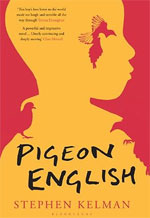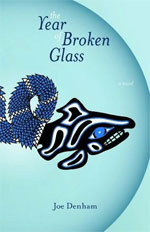
Stephen Kelman’s debut novel Pigeon English introduces readers to one of the most pervasively and persuasively authentic narrator voices in fiction in recent memory. That recent memory includes the precocious Jack in Room by Emma Donoghue and the quietly unforgettable Christopher in The Curious Incident of the Dog in the Night-time by Mark Haddon … which means that Kelman’s 11-year-old Harrison Opoku (known as Harri to his family and friends) is in admirable and luminous company.
Harri has just arrived in London from Ghana with his mother and teenaged sister, and is living in a housing estate that would be euphemistically labelled a “priority” or “at risk” neighbourhood in some constituencies. Harri’s family is asunder – his grandmother, father and infant sister remain behind in Ghana – and in some unspecified peril because of the terms by which some of them were able to come to England. Harri’s natural and infectious ebullience seems more affected by long distance yearnings for the people left behind than stymied or threatened by the more immediate cacophony surrounding him at home, at school and on the streets. Even when a boy is stabbed to death in his neighbourhood, it fascinates Harri more than it truly bothers or affects him, as the sound of his baby sister’s voice getting cut off on the phone clearly does.
Voices near and far are just one of an intricate interweaving of metaphors and imagery that Kelman handles with impressive assurance for a first-time novelist. Kelman controls well but not obtrusively not just his protagonist’s voice, but the chorus of supporting characters’ voices echoed and interpreted through the protagonist. Through his mastery of the subtleties of voice, accent and expression, Kelman also sensitively and precisely manages the perceptions that drive the story forward, and the misapprehensions and naivete that lead it understandably astray.
Kelman incorporates other types of potent imagery and weaves them organically and comfortably into Harri’s words and observations, without undermining the believability of Harri’s voice, but also of the gritty realities he faces navigating amongst schoolmates, gangs, shopkeepers, police officers and others in his inner-city world. References to fingerprints and fingertips are especially intriguing – how they are used to identify or when erased, to hide one’s identity – but also how they are used to gather information and experience the textures and sensations of the world. Much of the imagery builds on the feelings of a child hungry to learn, to grow, to love and be loved.
For a story and characters set in an unremittingly urban realm, much of the imagery infusing the world of Pigeon English is exhilaratingly natural, as illustrated in a sequence that captures what a wellspring of vitality and joie de vivre Harri is, in spite of it all:I don’t have a favourite raindrop, they’re all as good as each other. They’re all the best. That’s what I think anyway. I always look up at the sky when it’s raining. It feels brutal. It’s a bit hutious because the rain’s so big and fast and you think it will go in your eye. But you have to keep your eyes open or you won’t get the feeling. I try to follow one raindrop all the way down from the cloud to the ground. Asweh, it’s impossible. All you can see is the rain. You can’t follow just one raindrop, it’s too busy and all the other raindrops get in the way.
The best bit is running in the rain. If you point your face up to the sky at the same time as running, it nearly feels like you’re flying. You can close your eyes or you can keep them open, it’s up to you. I like both. You can open your mouth if you want. The rain just tastes like water from the tap except it’s quite warm. Sometimes it tastes like metal.
Before you start running, find an empty bit of the world with nothing in the way. No trees or buildings and no other people. That way you won’t crash into anything. Try to go in a straight line. Then you just run as fast as you can. At first you’re scared of crashing into something but don’t let it put you off. Just run. It’s easy. The rain on your face and the wind makes it feel like you’re going superfast. It’s very refreshing. I dedicated my rain run to the dead boy. It was a better present than a bouncy ball. I kept my eyes closed the whole time and I didn’t even fall over.
The only false note in Pigeon English is the intermittent introduction of a second narrative voice that can’t possibly match the authenticity and vivacity of Harri’s voice. This second voice neither expands the view of the story credibly beyond Harri’s perceptions and assessments, nor does it work well metaphorically as other imagery does. As well, the pigeon/pidgin pun is not only forced, but is ever-so-slightly offensive, and seems to strangely demean the book’s greatest achievement: its convincing voices in all of their linguistic originality and complexity. A pidgin language is defined as a simplified language that develops as a means of communication between two or more groups that do not have a language in common. Harri’s voice and vocabulary form a surprisingly sophisticated argot and amalgam of everything from Ghanaian, English and Ghanaian-English slang to commercial and technological terminology to his own sweet and singular usages and classifications of the world. It’s unforgettable and not to be diminished as something lesser or compromised.
When the book ends and Harri’s voice is stilled, this reader immediately, achingly, acutely missed him – true testament to the strength of an indelibly forged voice. Asweh, you won’t want to let go of young, vibrant Harri either.
See also:
Pigeon English book trailer (from House of Anansi Press blog)
Thank you to House of Anansi Press for providing a review copy of Pigeon English, by Stephen Kelman.

